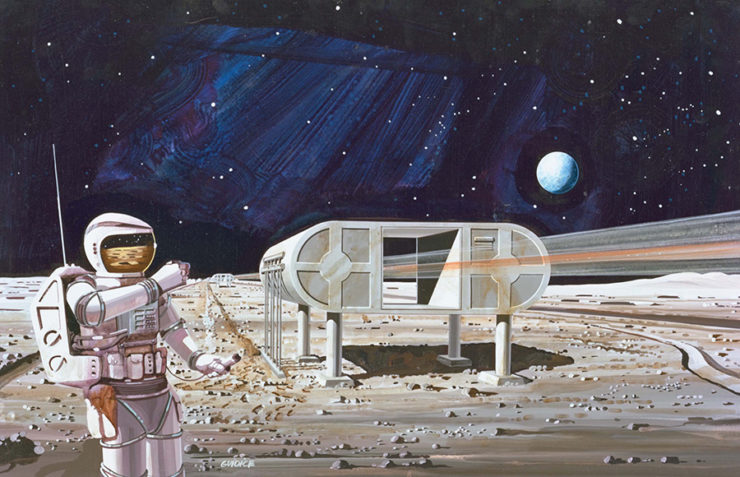Recently, there has been on Twitter a discussion of a cryptocurrency-driven seasteading effort so visionary, so unconcerned by petty questions of practicality, legality, and due diligence as to rival Scotland’s Darien scheme. A cynic might focus on the entirely predictable outcome—abject failure—but where would humanity be without people willing to commit themselves to bold colonization schemes unburdened by any chance of success? Considerably less amused.
Science fiction, of course, is not restricted to the Earth. It can, when its authors so choose, provide readers with delightful tales of ill-considered and/or unlucky attempts to settle worlds that prove to be much more challenging than anything Earth might offer. Take these five classic examples.
Methuselah’s Children by Robert A. Heinlein (1958)
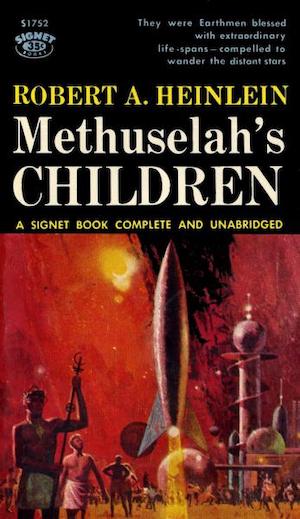
Products of an implausibly successful eugenics project, the long-lived Howard families become the focus of the mayfly masses’ paranoia that the Howards’ lifespan is not thanks to inherent genetic gifts but some secret they will not share. Life on Earth swiftly becomes untenable for the Howards. Those who can flee commandeer a sublight starship and flee to the stars, hoping to find a new world they can call home.
Earthlike worlds prove to be surprisingly common. There is however a small catch: the planet the Howards first encounter is already occupied. The alien Jockaira appear roughly comparable to humans. They are in fact property. The planet’s true masters are godlike, and they have no place for humans. An act of functionally divine will sends the Howards on their way… to a world whose gentle natives prove just as advanced in their way as the gods and even more disquieting to mortal humans.
Four-Day Planet by H. Beam Piper (1961)
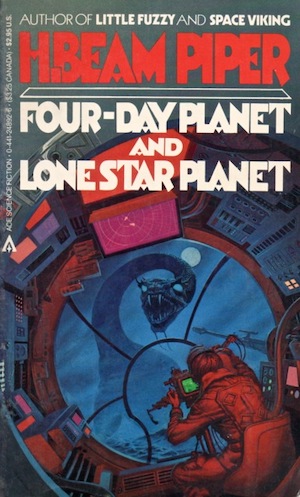
With the right air, the right gravity, a thriving biosphere, and a Sun-like star around which it orbits at the right distance, Fenris appears to qualify as a Class III Earthlike world, a planet unprotected humans can easily settle. Fenris’ day is the worm in this particular apple. Two thousand hours long, it guarantees extremes of temperature humans cannot survive without advanced, expensive technology.
At its peak, the planet had a quarter million people. Now it is down to ten thousand—those too poor or too stubborn to emigrate to Class III worlds. Fenris’ rudimentary economy depends on the export of tallow wax. However, exports are controlled by the Hunter’s Collective, and the Collective is in turn controlled by Steve Ravnick. Ravnick insists tallow wax prices are falling. Is Ravnick lying and pocketing undeclared profits? Unclear. What is clear is that Ravnick’s goons will do their best to kill anyone who asks that question.
We Who Are About To… by Joanna Russ (1977)
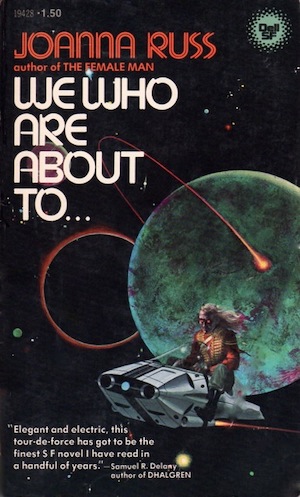
Mishaps in space tend to produce corpses in abundance. The eight survivors who find themselves on an empty, alien world appear to be extraordinarily fortunate exceptions. They did not die with their starship. While rescue can be ruled out, at least the world on which they will spend the rest of their lives is comparatively habitable.
Eight people equipped with meagre supplies retrieved from a dying starship cannot reasonably expect to colonize an unfamiliar world. Their numbers ensure inbreeding, their lack of equipment leaves them vulnerable to misfortune. The castaways have not so much survived as fallen victim to a more protracted form of death. Not that the certainty of failure deters some from resolving to trying to establish a thriving community in the name of preserving a human species that is flourishing…elsewhere.
The unnamed narrator has no desire to be some sort of castaway queen bee. Nor will she allow others to force her to comply. Pressing the point will prove, as her companions discover, quite fatal.
The Gates of Eden by Brian M. Stableford (1983)
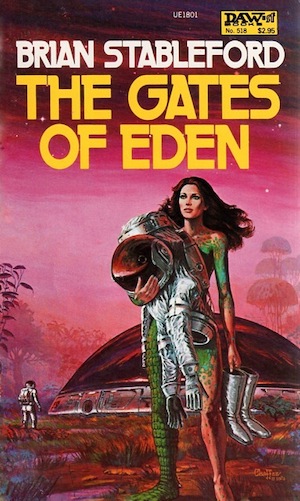
Faster than light travel comes with an insurmountable catch: hyperspace cannot be navigated without a hyperspace beacon at the destination. Such beacons can only be delivered at sublight speeds. By the 25th century, humanity knows of only a dozen life-bearing worlds, only two of which are habitable to humans, one of which is Earth and the other, Sule, is a world whose native civilization is equal to ours. Dreams of New Earth, empty and free for the taking, remain only dreams.
Now, however, a sublight probe proclaims Earth Three has been found. Even better, this pristine world has no cities, towns, or farms. There is no evidence that anything like Sule or Earth’s civilizations calls this world home. This is because, as unfortunate explorers will discover shortly before their painful demises, this world hosts something quite superior to their forms of life.
Black Sun Rising by C. S. Friedman (1991)
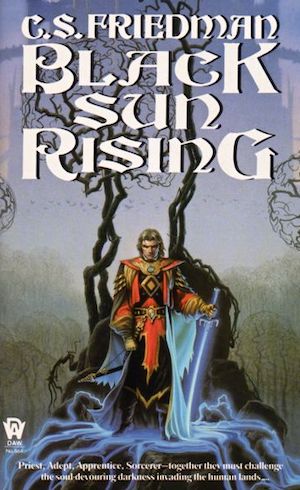
Despite incessant seismic activity, the planet Erna was too tempting to pass by. Earthlike worlds are rare. Frequent earthquakes are a small price to pay for a world on which humans can thrive without advanced life support equipment. As the first generation of colonists discovered to their considerable alarm, Erna has characteristics to which human technology is blind, characteristics that would have ruled out settling Erna.
Erna is home to the Fae, a mysterious force that transforms human whim into often horrifying reality. Mundane science and technology depend on nature’s predictable laws. Thanks to inherently unpredictably Fae, human technology swiftly regressed. Having lost the ability to flee Erna, the colonists’ distant descendants have no choice but to find some way to co-exist with the Fae or die trying.
No doubt there are far more recent examples of ill-fated colonization attempts, some of which are not Kim Stanley Robinson’s Aurora. Feel free to mention them in the comments!
In the words of Wikipedia editor TexasAndroid, prolific book reviewer and perennial Darwin Award nominee James Davis Nicoll is of “questionable notability.” His work has appeared in Publishers Weekly and Romantic Times as well as on his own websites, James Nicoll Reviews and the Aurora finalist Young People Read Old SFF (where he is assisted by editor Karen Lofstrom and web person Adrienne L. Travis). He is a four-time finalist for the Best Fan Writer Hugo Award and is surprisingly flammable.










